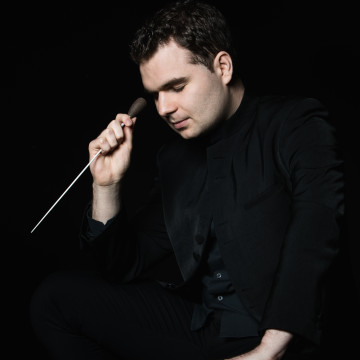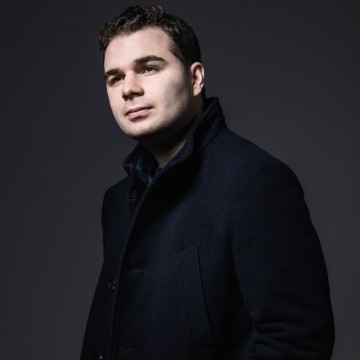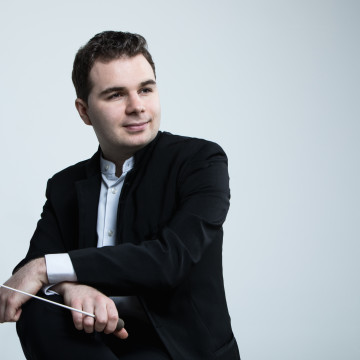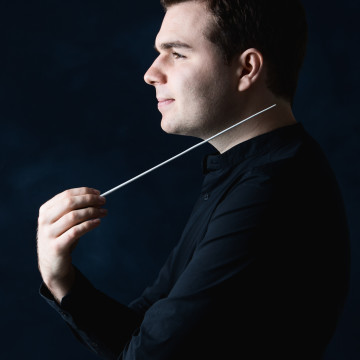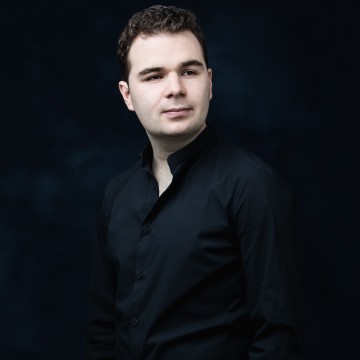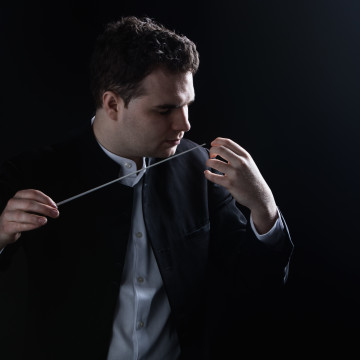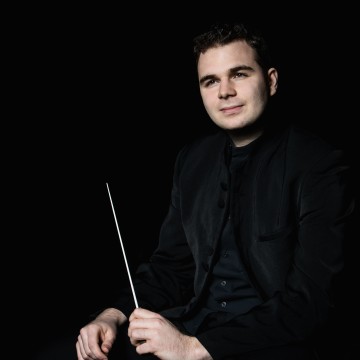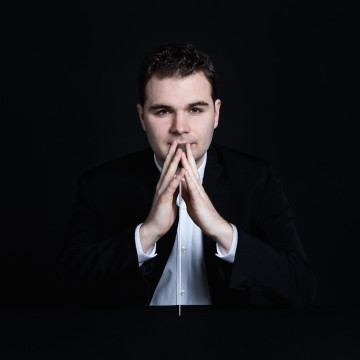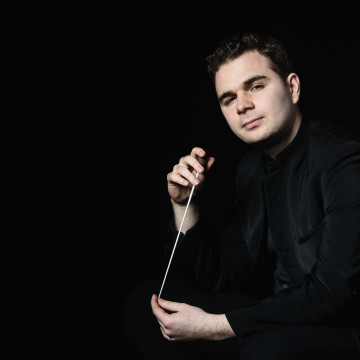Reviews – Kritik – Recenzioni – Critiques
- Le Nozze di Figaro, Premiere in Staatsoper Hannover (2022)
Was Dirigent Giulio Cilona an diesem Abend der Staatsoper Hannover mit Mozarts Figaro an musikalische Warhaftigkeit erreicht hat, das lässt vermuten, dass man einen so guten Dirigenten wohl kaum lange in Hannover halten können. Cilona zeigte ein außerordentliches Gespür für das richtige Pointieren, Phrasieren und Artikulieren dieser Musik. Er spitzte genauso zu, wie er perfekt ausbalancierte. (Cellesche Zeitung, 22.01.2022)
Translation: What the conductor Giulio Cilona achieved in terms of musical authenticity on this evening at the Hanover State Opera with Mozart’s Figaro suggests that such a competent conductor won’t stay in Hanover for very much longer. Cilona showed an extraordinary feeling for the correct accents, phrasing and articulation of this music. He brings in spark but also a perfect sound balance. (Cellesche Zeitung, 22.01.2022)
Aber nicht nur auf der Bühne werden musikalische Glanzstunden geboten, auch aus dem Orchestergraben tönt es geradezu fantastisch. Dort begeistert Giulio Cilona am Dirigentenpult durch seine außerordentliche Feinfühligkeit, mit der er das Niedersächsische Staatsorchester durch Mozarts Partitur führt. Das Orchester spielt klanglich strahlend und elegant, doch ebenso markant in den Phrasierungen, was bereits in der Ouvertüre deutlich wird und das Publikum auf einen musikalisch wertvollen Opernabend vorbereitet. (Kultur Feder, 24.01)
Translation: Not only on stage musical highlights are offered, it also sounds fantastic from the orchestra pit. There Giulio Cilona inspires at the conductor’s podium with his extraordinary sensitivity with which he leads the Lower Saxony State Orchestra through Mozart’s score. The orchestra plays brilliantly and elegantly. And the phrasing is just as striking, which clearly already from the Overture prepares the audience for a musically valuable evening at the opera. (Kultur Feder, 24.01)
Die musikalische Seite der Aufführung besticht maßgeblich durch das souveräne Dirigat von Giulio Cilona. Die Tempi sind extrem schnell genommen. Dabei wird jedweder überzogene Hochdruck oder eine etwaige Atemlosigkeit der Sänger oder Orchestermusiker vermieden. Vielmehr gelingt eine Dynamik in Spiel und Gesang, die die komisch-verwirrenden mit den verstörenden Elementen des Geschehens auf überraschende Weise verbinden. Es ist frappierend zu hören, dass eine solche hohe Meisterschaft von den Solisten und vom Orchester den gesamten Abend über durchgehalten werden kann. Das Niedersächsische Staatsorchester Hannover übertrifft sich hier selbst. (O-Ton, 20.01)
Translation: The musical side of the performance captivates significantly through the sovereign conducting of Giulio Cilona. The tempos are taken extremely quickly, yet any high pressure or possible breathlessness of the singers or orchestra musicians is avoided. Rather, a dynamic in playing and singing succeeds, which combines the comically confusing with the disturbing elements of the action in a surprising way. It is amazing to hear that such a high level of mastery can be maintained by the soloists and the orchestra throughout the evening. The Lower Saxony State Orchestra in Hanover surpasses itself here. (O-Ton, 20.01)
- Don Pasquale, Premiere at Opera National de Lorraine (December 2023)
Le chef Giulio Cilona, lauréat du 2ème Concours international de chefs d’orchestre à l’Opéra Royal de Wallonie-Liège, retrouve tout le panache qu’il avait inculqué aux Noces de Figaro à la Staatsoper Hannover début 2022. Le prodigieux dosage de la comédie à travers les tempos traverse l’œuvre d’une multitude de fulgurances, sur un tapis roulant continu de la gestion des équilibres. Accélérations et ralentissements contribuent à une construction virtuose de la précipitation des situations. La pasta instrumentale se forme dans l’émerveillement des caractères et articulations instrumentaux. Le directeur musical obtient d’un Orchestre de l’Opéra national de Lorraine des grands jours – on ne l’avait pas entendu aussi libre, attentif et précis depuis longtemps, avec une légèreté et une pétillance admirables. Ce superbe « pointillisme spaghetti », de continuité et de détail, se pare d’esprit jusque dans le moindre arpège, interprété comme un roulis doublé de tourbillons émotifs. (T. Vicq, Operaonline, 18.12.2023)
Translation: Conductor Giulio Cilona, winner of the 2nd International Conductors Competition at the Royal Opera of Wallonia-Liège, finds once more all the panache that he had instilled in The Marriage of Figaro at the Staatsoper Hannover in 2022. The prodigious dosage of comedy across perfect tempos progression throughout the opera and a multitude of flashes, always extremely well managing balances. Accelerations and slowdowns contribute to a virtuoso construction of the precipitation of situations. The instrumental paste is formed in the wonder of instrumental characters and articulations. The musical director obtains great days from an Orchestra of the National Opera of Lorraine – we have not heard them so free, attentive and precise for a long time, with admirable lightness and sparkle! This superb italian pointillism, of continuity and detail, is adorned with spirit, down to the slightest arpeggio, interpreted as a roll full of emotional swirls.
La direction de Giulio Cilona assure le spectacle, ménageant des effets entre virtuosité aérienne et gourmandise des accents rythmiques. Maître d’œuvre de cette entreprise réjouissante et goguenarde, il sait actionner tous les leviers qui font le succès d’une soirée pyrotechnique et divertissante. (D.Verdier, Altamusica.com, 18.12.2023)
Translation: Giulio Cilona’s conducting ensures a great spectacle, creating effects between aerial virtuosity and abundance of rhythmic accents. Mastering this delightful piece, Cilona knows exactly how to operate all the levers that make this evening pyrotechnic, entertaining and successful!
Star montante de la direction d’opéra, protéiforme, le chef Giulio Cilona apporte vigueur et motricité rythmique sans jamais compromettre la précision et la mise en place des ensembles. Un sans-faute auquel contribue l’Orchestre de l’Opéra national de Lorraine par sa plénitude son énergie et sa constante cohésion. (M. Thomé, Res Musica , 18.12.2023)
Translation: Rising star of opera conducting, conductor Giulio Cilona brings vigor and rhythmic motor skills without ever compromising the precision and implementation of the ensembles. A flawless performance to which the Orchestra of the National Opera of Lorraine contributes with its fullness, energy and constant cohesion.
À la tête de l’Orchestre de l’Opéra national de Lorraine, le chef Giulio Cilona transmet à cette partition toute son énergie et sa vitalité rythmique, sans gommer la dimension romantique. Le public fait un très chaleureux accueil à ce spectacle éminemment divertissant, pétillant de la première note à la dernière et infiniment rafraîchissant. (P. Delacour, Ôlyrix, 18.12.2023)
Translation: At the head of the Orchestra of the Opéra national de Lorraine, conductor Giulio Cilona transmits all his energy and rhythmic vitality to this score, without erasing any of the romantic dimension. The public gave a very warm welcome to this eminently entertaining show, sparkling from the first note to the last, and infinitely refreshing!
- Il Barbiere di Siviglia, Premiere at Teatro Sociale di Rovigo/Teatro Aligheri di Ravenna (2023)
La prima componente, assolutamente fondamentale, è la scattante direzione musicale, tutta all’insegna di una visione effervescente del capolavoro rossiniano, che porta in Italia un talento emergente, quello di Giulio Cilona […] Presiedendo anche al fortepiano – è anche un valido concertista […] il giovane maestro belga/americano ci porge una concertazione di prodigiosa teatralità: nitida, luminosa e arguta, ricca di belle annotazioni strumentali, molto attenta al lavoro dei cantanti. (Gilberto Mion, teatro.it)
Translation: The first component, absolutely fundamental, was the snappy musical direction, all in the name of an effervescent vision of Rossini’s masterpiece, which brings an emerging talent to Italy, that of Giulio Cilona […] Also presiding over the fortepiano – he is also a very efficient recitative performer […] the young Belgian/American maestro offers us a performance of prodigious theatricality: clear, bright and witty, full of beautiful instrumental intentions, yet very attentive to the work of the singers. (Gilberto Mion, teatro.it)
Eccelente la prova di Giulio Cilona, maestro concertatore e direttore d’orchestra, che ha coniugato l’accompagnamente dei recitativi al clavicembalo con una direzione precisa e fortemente espressiva, unendo chiarezza del gesto e gusto del fraseggio. L’Orchestra Regionale Filarmonia Veneta e il Coro Lirico Veneto hanno senza dubbio tratto vantaggio da una guida tanto valida. (Sofia Teresa Rici, Il Gazzetino)
Translation: Excellent performance by Giulio Cilona, conductor and fortepianist, who combined the accompaniment of the recitatives on the Fortepiano with a clear and very expressive conducting; uniting clearness of the gesture and taste in phrasing. The Orchestra Regionale Filarmonia Veneta and the Coro Lirico Veneto were most definitely advantaged by such a valid guidance. (Sofia Teresa Rici, Il Gazzetino)
Al suo debutto italiano, Giulio Cilona offre una lettura scrupolosa della partitura. Evita ogni contaminazione con gli eccessi della tradizione post romantica e verista, ma non cede nemmeno alla moda del Rossini barochizzato o magari iper-veloce. L’iperbole ritmica viene attenuata, senza per questo rinunciare alla vivacità scattante e al ritmo teatrale; il cantabile risulta disteso e ben assecondato, le simmetrie rossiniane sono rese con nitidezza. Si intuisce una concertazione accurata, che riesce a ricavare il meglio dall’Orchestra Regionale Filarmonia Veneta. Impegnato anche al fortepiano, Cilona contribuisce inoltre a rendere vari ed espressivi i recitativi degli interpreti. Ne esce un Rossini che coglie con spontaneità e misura il passaggio del Barbiere dal Settecento all’effervescenza del nuovo secolo, con fraseggi incisivi, attenzione ai dettagli timbrici, taglio comico ben calibrato e non privo di eleganti aperture liriche. (Roberto Mori, Connessi all’Opera)
Translation: In his Italian debut, Giulio Cilona offers a scrupulous reading of the score. He avoids any contamination with the excesses of the post-romantic and verismo tradition, but neither does he give in to the fashion of the baroque or perhaps hyper-fast Rossini. The rhythmic hyperbole is attenuated, without giving up the lively liveliness and the theatrical rhythm; the cantabile is relaxed and well supported, Rossini’s symmetries are clearly rendered. You can sense careful concertation, which manages to get the best out of the Filarmonia Veneta Regional Orchestra. Also involved in the fortepiano, Cilona also contributes to making the performers’ recitatives varied and expressive. The result is a Rossini who spontaneously captures and measures the passage of the Barbiere from the eighteenth century to the effervescence of the new century, with incisive phrasing, attention to timbral details, a well-calibrated buffo dimension and not missing its elegant lyrical moments.
- La Donna del Lago, Buxton International Festival, UK (July 2022)
From a musical perspective this was a Donna del Lago to treasure (Bachtrack.com)
Giulio Cilona leads the Northern Chamber Orchestra in a well-paced account of the score […] Cilona imbuing the performance with energy where needed, but also giving the arias space to breathe as necessary. If only the production itself kept up with the virtuosic standards of the music this would be a top-notch realisation of Rossini. (Classical Source, Curtis Rogers)
Audio & Videos
Le Nozze di Figaro – Premiere in Hannover State Opera 20.01.22 – Livestream on Operavision
Livestreamed Performance: https://www.youtube.com/watch?v=sTwwp9BIPyQ&t
Conductor video interview: https://www.youtube.com/watch?v=cUPNWlCxby4
Gershwin – Concerto in F – Norbert Nozy, Conductor – Giulio Cilona, Piano.
M.Ravel “Miroirs”: 4. ‘Alborada del Gracioso’ – Recording in Namur – Giulio Cilona, Piano.
